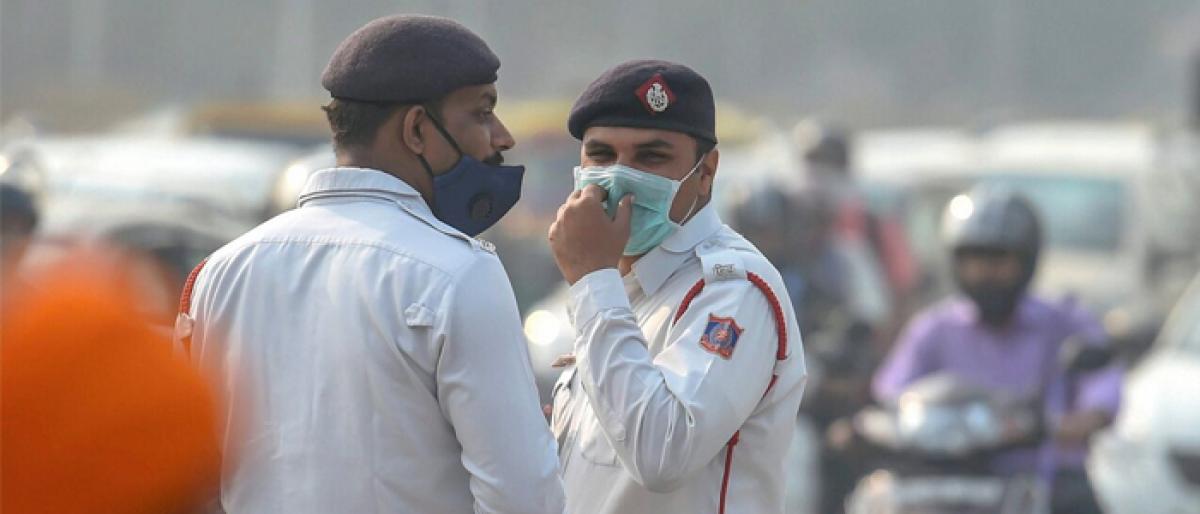Live
- Olympic Qualifier Series electrifies athletes and fans in Shanghai
- IPL 2024: Dhoni arrives in Ranchi after CSK's campaign comes to an end
- Formula 1: Verstappen wins Emilia Romagna Grand Prix, Norris finishes second ahead of Leclerc
- PM Modi says 'this is Bharat's moment'; urges youth to 'dream big'
- IPL 2024: I wouldn't want to bowl against him, says Cummins about Abhishek after win against PBKS
- TN govt to take decision on opening of river sand quarries after LS poll
- IPL 2024: Season has been good, but haven’t got as many wickets as I would have liked, says Avesh Khan
- Captain Gopichand becomes 1st Indian to tour space aboard Blue Origin
- Delhi: Four, including two minors, held for killing man after spat
- J&K: Election Dept takes action against 40 govt employees for MCC violation
Just In
‘No construction’ during Nov 1-10, curbs likely on private vehicles


Halting all construction activities from November 1 for 10 days and intensifying patrolling in hot spots are among the measures directed by the Supreme Courtappointed Environment Pollution Control Authority EPCA, which is considering even regulating use of private vehicles in the wake of an alarming rise in air pollution in Delhi
EPCA for intensified patrolling in industrial areas and other hot spots to completely stop waste burning and industrial emissions
New Delhi: Halting all construction activities from November 1 for 10 days and intensifying patrolling in "hot spots" are among the measures directed by the Supreme Court-appointed Environment Pollution Control Authority (EPCA), which is considering even regulating use of private vehicles in the wake of an alarming rise in air pollution in Delhi.
The EPCA's directions to the Delhi Pollution Control Committee came after it accepted the recommendations of a Central Pollution Control Board-led task force for the period between November 1 to 10 when further deterioration of air is expected due to festival season and stubble burning in neighbouring states.
The order includes halt of all construction activities involving excavation, civil construction to remain closed in Delhi and other NCR districts from November 1-10, closure of all stone crushers, hot mix plants generating dust pollution in Delhi and NCR districts from November 1-10.
All industries using coal and biomass as fuel (excluding thermal and waste to energy plants) to remain closed in Delhi and NCR districts from November 4-10 is another order.
The EPCA has also asked DPCC to direct transport department and traffic police to intensify checking of polluting vehicles and control travel congestion in Delhi and other NCR districts during November 1-10.
It has also asked for intensified patrolling in industrial areas and other hot spots to completely control waste burning and industrial emissions.
Following the direction from the EPCA, the DPCC notified Delhi Development Authority, Navratna Central Public Sector units, Delhi Metro Rail Corporation, Delhi Transport Corporation, National Highways Authority of India, India Meteorological Department, New Delhi Municipal Council, South Delhi Municipal Council, East Delhi Municipal Council and Public Works Department to enforce these measures.
"There should be no tolerance for visibly pollution vehicles. This will require stringent monitoring and on-spot fines for visibly polluting vehicles," the DPCC said in its direction.
An EPCA official also said if the air continues to deteriorate further even after the implementation of measures introduced under the emergency plan, then they may regulate use of private vehicles.
The EPCA has also asked DPCC to publish advisory in newspapers for public, recommending them to reduce outdoor activities and minimise their travel using private vehicles as much as possible, the official said.
The EPCA has asked DPCC to give order to all government agencies concerned in this regard, an official said. Under the advisory to be issued to the public, the DPCC has also been asked to publish list of penalties that have been imposed and actions taken against people and industries found polluting.
The national capital has been grappling with dangerous levels of pollution for the last two weeks. The overall Air Quality Index (AQI) at 3 pm was 401, falling in the 'severe' category, the highest this season, Central Pollution Control Board officials said.
Centre-run System of Air Quality Forecasting and Research (SAFAR) recorded the AQI at 410. Eighteen areas in Delhi recorded 'severe' air quality with the highest AQI at 4 PM recorded at Anand Vihar at 467, according to a data by the CPCB.
Faridabad, Ghaziabad, Gurgaon and Noida recorded 'severe' air pollution, crossing the AQI of 400. Greater Noida's air is also on the brink of turning severe, the data said.
SAFAR has attributed the spike to "heavy stubble burning in the last 24 hours and calm winds". About 28 per cent of pollution by PM2.5 (presence of particles in the air with a diameter of less than 2.5 micrometers) on Tuesday was caused due to regional factors like stubble burning, SAFAR officials said.
A SAFAR official said pollution is likely to increase faster now with lead pollutant as PM10 because of new development as shown by SAFAR-model where it is indicating that western disturbances may hit over western Himalayan region from October 31.
"Lot of moisture is already getting introduced in Delhi sky as an early signature. The withdrawal will bring even more moisture in the air and result in fall in temperature. Upper winds already turned north-westerly (stubble site) today.
Only favourable thing is that upper wind speed is moderate and fire counts are low," the official said. The leading factors causing severe pollution levels also include moisture and heavy air. "The increase in surface wind speed can only prevent AQI to cross severe zone," the official said.
The Indian Institute of Tropical Meteorology (IITM) also spotted a large number of biomass fire spots through satellite images in neighbouring states of Delhi.

© 2024 Hyderabad Media House Limited/The Hans India. All rights reserved. Powered by hocalwire.com






